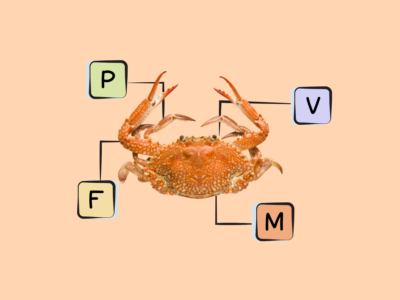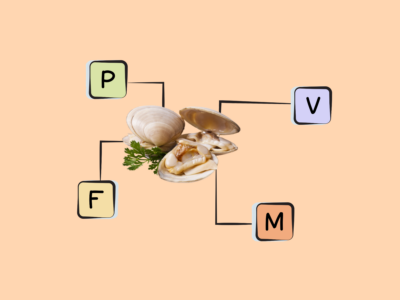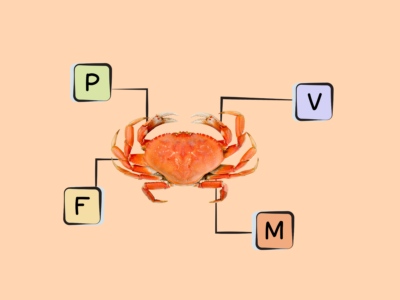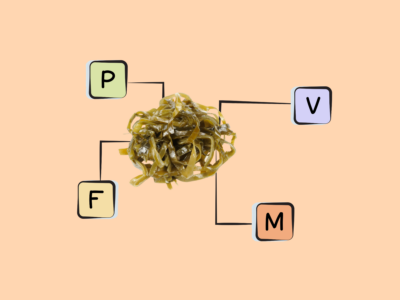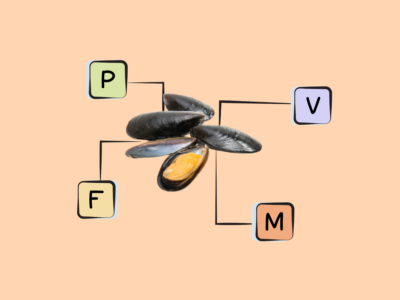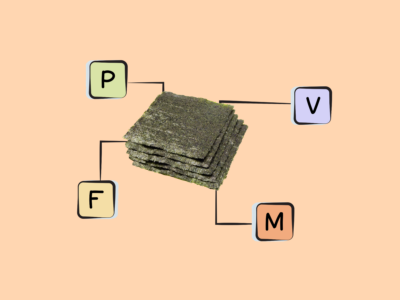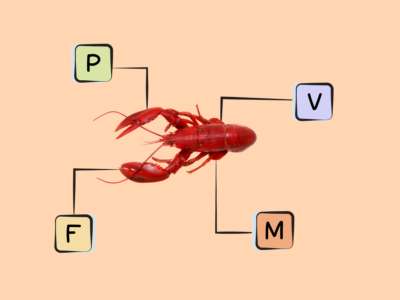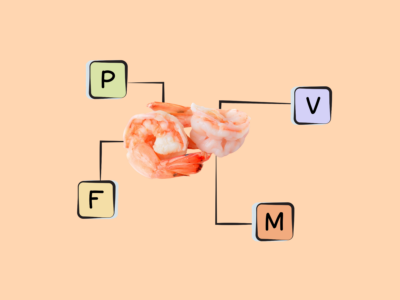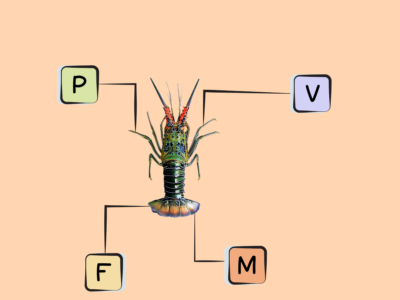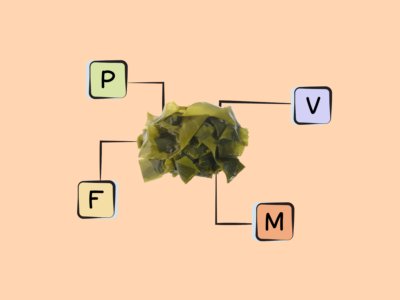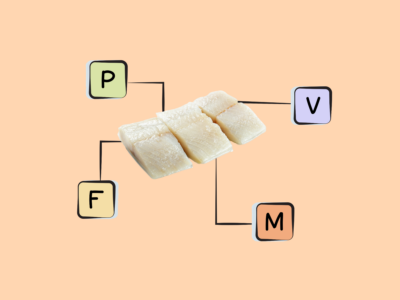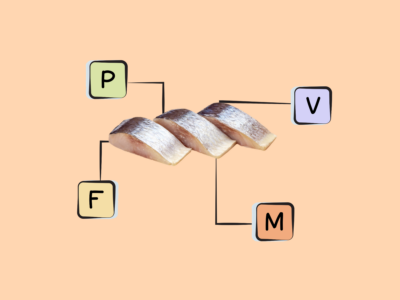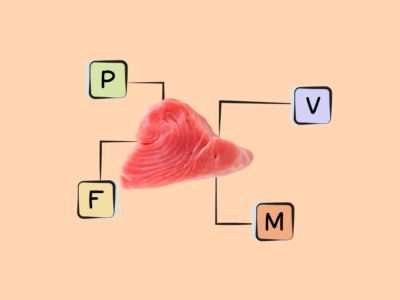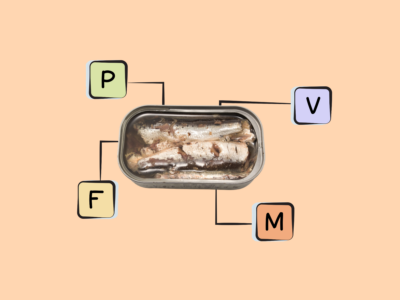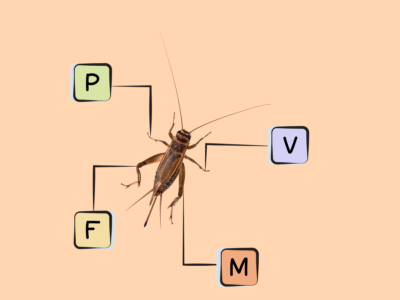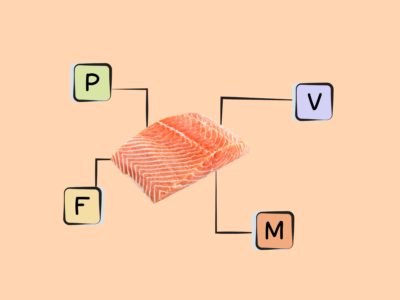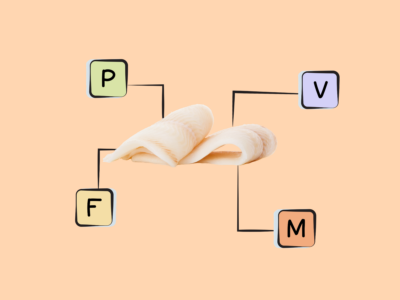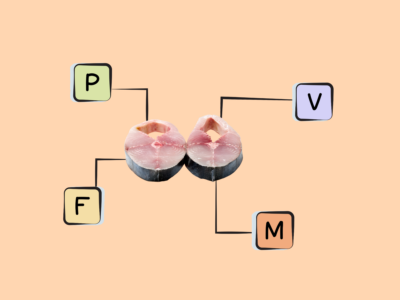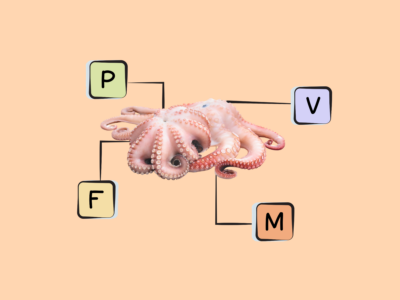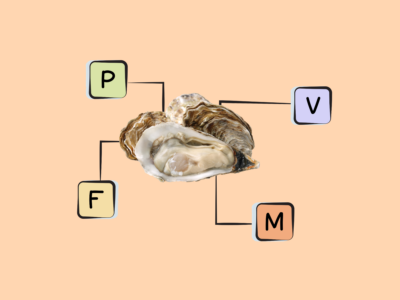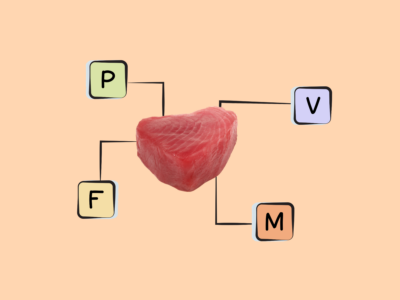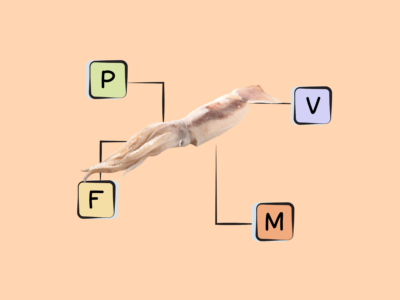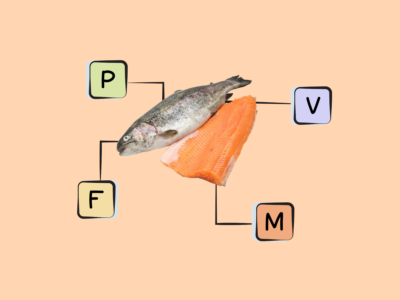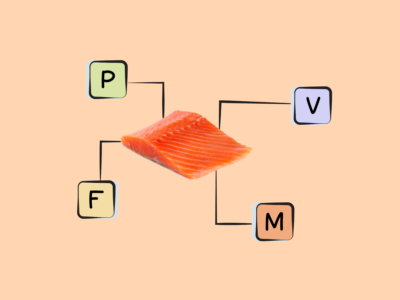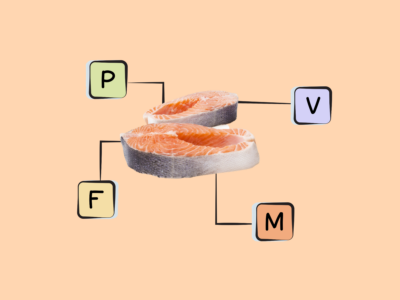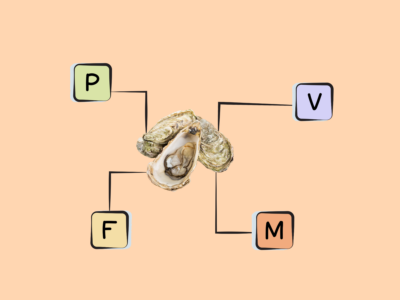Key Takeaways (expand)
- Iodine is an essential trace mineral that’s particularly concentrated in seawater.
- Iodine is a structural component of thyroid hormones, making up over half the molecular weight of thyroxine (T4) and triiodothyronine (T3); this gives it a vital role in thyroid function.
- By helping produce thyroid hormones, iodine assists in regulating numerous biological processes—including metabolism, carbohydrate absorption, fatty acid release, growth, development, and reproductive function.
- In body tissues that take up iodine, this nutrient can act as an antioxidant and anti-proliferant.
- Some foods (including soy, cassava, millet, beans, and cruciferous veggies) contain goitrogens that can block iodine uptake by the thyroid, potentially interfering with thyroid function; but, this only appears to happen with extremely high consumption of these foods, and/or when iodine intake is low.
- Iodine is particularly important during pregnancy: insufficiency can increase the risk of preeclampsia, placental eruption, stillbirth, miscarriage, preterm delivery, and neurocognitive deficits and hypothyroidism in the newborn.
- Due to serving as a component of thyroid hormones, iodine also supports brain and central nervous system development in children.
- Some evidence suggests iodine can help treat fibrocystic breast changes (a condition characterized by lumpiness and discomfort in the breasts).
- Iodine plays a potentially protective role against some cancers, particularly breast cancer and gastric cancer—although more research is needed!
- When radiation-related environmental emergencies occur, iodine (in the form of potassium iodide) can help protect the thyroid by blocking the uptake of harmful radioactive iodine.
- About 30% of the world’s population doesn’t consume enough iodine.
- Iodine deficiency can cause a spectrum of health problems such as goiter (enlarged thyroid), hypothyroidism, and irreversible mental and physical problems known as congenital iodine deficiency syndrome in the offspring of iodine-deficient mothers.
- Great sources of iodine include seaweed (especially brown seaweeds like kelp and wakame), shellfish, fish, eggs, and dairy products.
Table of Contents[Hide][Show]
Iodine is an essential trace mineral that’s found in organisms of every biological kingdom, and is particularly concentrated in seawater. In fact, scientists believe it played a fundamental role in the evolutionary history of life! This nutrient was first discovered in 1811, when a French chemist named Barnard Courtois was extracting potassium and sodium from the ashes of seaweed, in attempt to find an alternative way to produce saltpeter (potassium nitrate) for gunpowder. When he accidentally added too much sulfuric acid to the seaweed ash, a cloud of purple vapor erupted, condensed onto the copper vats in the room, and formed crystals of solid iodine! Owing to its vapor color, the name iodine comes from the Greek word iodes, meaning violet.
Iodine is a constituent of thyroid hormones, making it essential for thyroid functioning. It’s needed for the endocrine system, the digestive system, and reproductive health.
The best food sources of iodine are sea vegetables (especially brown seaweeds like kelp and wakame). Fish, shellfish, eggs, and dairy products are also good sources of this nutrient. Some other land-based foods like fruit and grains also contain iodine, but the amount depends on the iodine content of the soil they were grown in, which can vary considerably (for example, mountainous or inland regions tend to have lower-iodine soil, while coastal regions have higher amounts of iodine in the soil due to the proximity to iodine-rich saltwater). Table salt is also widely fortified with iodine (AKA iodized).
what are The Biological Roles of Iodine?
One of this nutrient’s most important roles is in thyroid function—specifically, the production of thyroid hormones! First, the thyroid gland pulls iodine from the blood and integrates it into a glycoprotein called thyroglobulin, which then gets hydrolyzed by lysosomal enzymes to create thyroid hormones: thyroxine, or T4 (the most abundant circulating thyroid hormone) and triiodothyronine, or T3 (the physiologically active thyroid hormone that can regulate gene expression by binding to thyroid receptors in cell nuclei). Iodine plays a major structural role here, comprising over half the molecular weight of both T4 and T3. After being produced, these thyroid hormones are stored and released into circulation whenever they’re needed, mostly in the form of inactive T4. Next, selenium steals the show: target tissues in the body (particularly the liver and brain) use selenium-dependent enzymes called iodothyronine deiodinases to convert that T4 into T3, by removing one iodine atom from T4. Two of these selenium-containing enzymes (deiodinases type 1 and 2) are able to catalyze the T4 to T3 conversion, while a third selenium-containing enzyme (deiodinase type 3) can turn both T3 and T4 into inactive metabolites.
From there, thyroid hormones are able to regulate a variety of processes in the body: they act upon gene transcription mechanisms to regulate metabolism (thyroid hormone deficiency can reduce the basal metabolic rate by up to 50%!), they act on small intestine cells to increase carbohydrate absorption, they act upon adipocytes (fat cells) to induce fatty acid release, and they play major roles in growth, development, and reproductive function!
In all, up to 80% of all the iodine in the adult human body is found in the thyroid gland. But, this nutrient is also found in several other parts of the body, including the eyes, stomach mucosa, mammary glands, cervix, cerebrospinal fluid, artery walls, salivary glands, and ovaries. In tissues that can take up iodine, it can even act as an antioxidant and anti-proliferant!
How Does Iodine Interact with Other Nutrients?
Iodine has some important nutrient interactions, too. Selenium, iron, and vitamin A deficiency can all potentially worsen the effects of iodine deficiency: selenium (as part of selenium-dependent iodothyronine deiodinases) may play a role in regulating iodine homeostasis, and iron-deficiency anemia can impair thyroid metabolism. Meanwhile, vitamin A deficiency may interfere with the pituitary-thyroid axis and reduce iodine uptake by the thyroid gland.
Some foods also contain substances called goitrogens that can block iodine uptake by the thyroid and subsequently interfere with thyroid hormone synthesis. Goitrogen-containing foods include cassava, soy, millet, sweet potatoes, beans, and cruciferous vegetables like broccoli, cauliflower, cabbage, and Brussels sprouts. However, most research shows that these foods are unlikely to cause harm in real-world settings unless eaten in extremely high quantities, or in the presence of existing iodine deficiency. (In other words, no need to avoid otherwise nutrient-dense plant foods!)
Want to know the top 25 foods for this awesome nutrient?
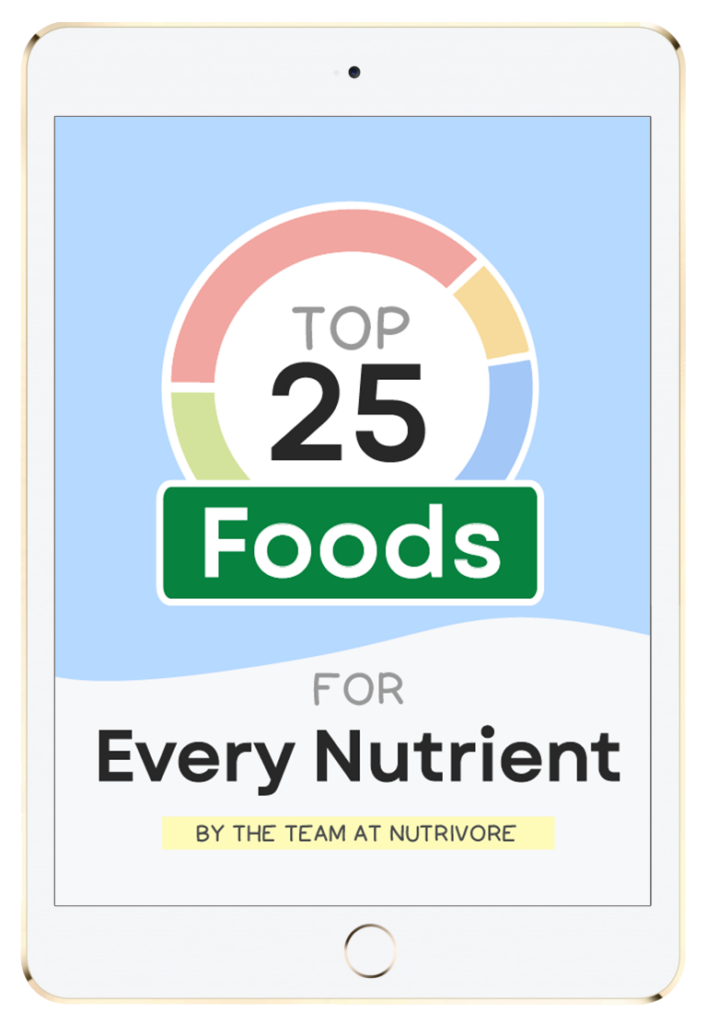
The Top 25 Foods for Every Nutrient
The Top 25 Foods for Every Nutrient e-book is a well-organized, easy-to-use, grocery store-friendly guide to help you choose foods that fit your needs of 43 important nutrients while creating a balanced nutrient-dense diet.
Get two “Top 25” food lists for each nutrient, plus you’ll find RDA charts for everyone, informative visuals, fun facts, serving sizes and the 58 foods that are Nutrient Super Stars!
Buy now for instant digital access.
How Does Iodine affect Health and Disease?
Due to its essential nature for endocrine, reproductive, and digestive functioning, iodine is key for maintaining health and protecting against a number of health conditions. Through its role in thyroid hormone production, iodine plays roles in endocrine health, metabolism, reproductive function, carbohydrate absorption, fatty acid release, growth, and development. It’s shown potential anti-cancer and antioxidant activity, and is particularly important during pregnancy for preventing complications like preeclampsia, miscarriage, preterm delivery, and stillbirth.
Iodine is also critical for the central nervous system development of children. Iodine deficiency can lead to goiter (enlarged thyroid) and hypothyroidism, as well as spectrum of irreversible behavioral and physical problems (known as congenital iodine deficiency syndrome) in children born from iodine-deficient mothers.
Iodine and Pregnancy
Getting enough iodine is particularly important during pregnancy and lactation, for both mother and child! Fetuses are completely dependent on their mother for thyroid hormones while their thyroid glands are still developing (up through 16-20 weeks’ gestation), and breast-fed infants rely entirely on iodine from their mothers in order to produce their own thyroid hormones.
Meanwhile, pregnant or nursing individuals lose iodine through late-gestation transfer to the fetus, increased excretion in the urine, and breast milk production. In fact, in iodine-sufficient pregnant people, the size of the thyroid gland increases by about 10% to accommodate the higher need for iodine utilization and thyroid hormone production; that size increase is 20-40% for women from iodine-deficient regions! As a result, sufficient iodine during pregnancy helps protect against issues like placental eruption, stillbirth, preeclampsia, preterm delivery, miscarriage, and congenital hypothyroidism or neurocognitive deficits in the newborn.
Iodine and Development
By serving as a component of thyroid hormones, iodine is also important for the brain and central nervous system development in children.
From the fetal stage and up through childhood, iodine-containing thyroid hormones influence the architecture of the brain’s cortex, the myelination of the central nervous system, the formation of axonal connections, and the differentiation, proliferation, and migration of certain neuron groups. Some observational studies have found that chronic iodine deficiency is associated with a 7 to 13.5-point reduction in the IQ scores of children, and additional research suggests that school-age children living in iodine-deficient areas have a higher likelihood of learning disabilities and poor school performance (relative to matched groups from iodine-sufficient regions). So, iodine is supremely important for supporting brain development during this critical stage of life!
Iodine and Fibrocystic Breasts
Iodine can also potentially help treat fibrocystic breast changes—a common, benign condition characterized by discomfort and lumpiness in the breasts. In rodent studies, iodine deficiency has been shown to cause changes resembling those in fibrocystic breasts, while restoring iodine status reverses those changes. Several small human trials have likewise shown the use of iodine supplementation improves pain and other symptoms among women with fibrocystic changes—though larger, controlled clinical trials are needed to confirm these findings!
Iodine and Cancer
Some evidence also suggests a potential anti-cancer role for iodine. Observational studies indicate an inverse relationship between high-iodine diets and breast cancer incidence, and in vitro experiments show that iodine may inhibit breast cancer by modulating the estrogen pathway (more specifically, altering gene expression and up-regulating proteins involved in estrogen metabolism, in turn inhibiting the estrogen response).
Likewise, some limited research suggests an association between iodine deficiency, iodine-deficient goiter, and gastric cancer—possibly due to the antioxidant role of iodine in the gastric mucosa, and more specifically its ability to detoxify reactive oxygen species like hydrogen peroxide.
Iodine and Radioactivity
One form of iodine, potassium iodide, can be used to block the uptake of radioactive iodine released during radiation-related environmental emergencies. This helps protects the thyroid gland from injury.
Iodine and Thyroid Health
Among people who aren’t repairing an iodine deficiency, long-term excessive intake of iodine (above the tolerable upper limit of 1,100 micrograms per day) can increase the risk of hypothyroidism and iodine-induced goiter, due to causing elevated TSH levels and subsequently inhibiting thyroid hormone production. The risk of hypothyroidism is particularly high when iodine intakes exceed 18,000 mcg daily.
Similarly, in iodine-deficient people, rapidly increasing iodine intake can induce hyperthyroidism—especially among older individuals with multi-nodular goiter (in which thyroid nodules develop that are unresponsive to TSH, and which may overproduce thyroid hormones once iodine intake goes up). Iodine-induced hyperthyroidism can cause weight loss, high pulse rate (tachycardia), skin warmth, and muscle weakness.
Didn’t know iodine was this amazing? Maybe your friends will enjoy this too!
What are the Health Effects of Iodine Deficiency?
Although many countries (120 and counting!) have implemented iodine fortification programs to help stop widespread deficiency, insufficient dietary iodine is still a major issue in many parts of the world, and is even considered the most common cause of preventable brain damage globally. In fact, about 30% of the world’s population is estimated to have insufficient iodine intake, including a third of school-aged children. Because meat and dairy products are common sources of iodine, vegans who don’t consume iodized salt or iodine-rich seaweed can also be at increased risk.
When iodine deficiency occurs, it can lead to a spectrum of health problems collectively referred to as iodine deficiency disorders. One of the earliest manifestations of iodine deficiency is goiter (enlarged thyroid), which happens when the body senses low levels of circulating T4, causing the pituitary gland to ramp up secretion of thyroid-stimulating hormone (TSH) in order to spur the thyroid to trap more iodine and synthesize more thyroid hormones. When TSH levels stay persistently elevated, the thyroid gland adapts by enlarging, which allows it to maximize iodine uptake from the body’s limited supply. If the resulting goiter becomes too big, it can obstruct the esophagus and trachea.
As iodine deficiency progresses, it impairs the synthesis of thyroid hormones and causes hypothyroidism. Hypothyroidism is particularly damaging when it occurs in very early life, because it can harm many aspects of growth and development (including brain development), sometimes leading to intellectual disability. In some cases, severe iodine deficiency during pregnancy can lead to a condition called congenital iodine deficiency syndrome, which includes irreversible mental and physical problems in the offspring such as mutism, deafness, and motor spasticity. Adults can also suffer from hypothyroidism from iodine deficiency, leading to symptoms like fatigue, cold intolerance, weight gain, and constipation; some research even shows a link between adult hypothyroidism and poor economic and social achievements, due to the reduced work productivity and psychological effects (such as apathy and inability to think clearly) that hypothyroidism can cause!
Importantly, iodine deficiency can increase the risk of radiation-induced thyroid cancer among people of all ages. This is because iodine deficiency causes the thyroid to increase its iodine-trapping activity, leading to a greater accumulation of radioactive iodine (when it’s present in the environment) that can ultimately induce cancerous changes in the thyroid gland.
People with higher iodine requirements (including infants and pregnant or lactating people), as well as people eating special diets (excluding seafood and/or iodized salt), are at increased risk of developing iodine deficiency, even when living in iodine-sufficient areas of the world.
Everything You Need to Jump into Nutrivore TODAY!
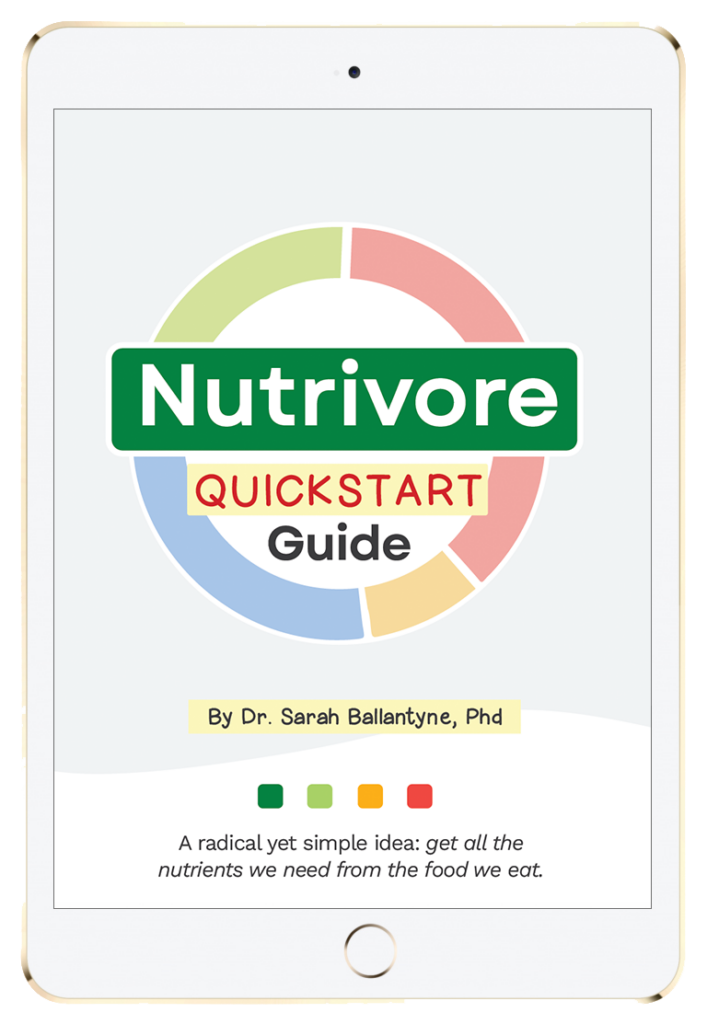
Nutrivore Quickstart Guide
The Nutrivore Quickstart Guide e-book explains why and how to eat a Nutrivore diet, introduces the Nutrivore Score, gives a comprehensive tour of the full range of essential and important nutrients!
Plus, you’ll find the Top 100 Nutrivore Score Foods, analysis of food groups, practical tips to increase the nutrient density of your diet, and look-up tables for the Nutrivore Score of over 700 foods.
Buy now for instant digital access.
What are the Problems From Too Much Iodine?
While rare, acute iodine toxicity is possible from ingesting many grams of iodine in one sitting, leading to symptoms like nausea, vomiting, diarrhea, a weak pulse, a burning mouth or stomach, fever, and even coma. Some people also have increased sensitivity to iodine due to preexisting conditions—such as Graves disease, autoimmune Hashimoto thyroiditis, or a history of partial thyroidectomy—and may have adverse reactions to iodine at levels even lower than the tolerable upper intake amount.
Fortunately, even the best foods sources of iodine contain levels well below the tolerable upper limit, and most iodine-containing supplements (such as multivitamins) don’t contain substantial amounts of this nutrient. For these reasons, iodine poisoning is relatively rare. Nonetheless, due to the side effects that can occur from excess iodine among certain groups, it’s important to seek medical advice from your health care provider before supplementing with high doses of iodine.
How Much Iodine Do We Need?
The recommended dietary allowance for iodine is 150 micrograms daily for adults and adolescents, 220 micrograms daily during pregnancy, and 290 micrograms daily while breastfeeding. Although the thyroid gland only needs 70 micrograms per day to synthesize enough T4 and T3, the RDAs are set higher in order to support optimal functioning of other body systems (including the stomach and mouth mucosa, arterial walls, skin, cerebrospinal fluid, and salivary glands).
| 0 – 6 months | |||||
| 6 months to < 12 months | |||||
| 1 yr – 3 yrs | |||||
| 4 yrs – 8 yrs | |||||
| 9 yrs – 13 yrs | |||||
| 14 yrs – 18 yrs | |||||
| 19 yrs – 50 yrs | |||||
| 51+ yrs | |||||
| Pregnant (14 – 18 yrs) | |||||
| Pregnant (19 – 30 yrs) | |||||
| Pregnant (31 – 50 yrs) | |||||
| Lactating (14 – 18 yrs) | |||||
| Lactating (19 – 30 yrs) | |||||
| Lactating (31 – 50 yrs) |
Nutrient Daily Values
Nutrition requirements and recommended nutrient intake for infants, children, adolescents, adults, mature adults, and pregnant and lactating individuals.
What are the Best Food Sources of Iodine?
The following foods have high concentrations of iodine, containing at least 50% of the recommended dietary allowance per serving, making them our best food sources of this valuable mineral!
Want to know the top 500 most nutrient-dense foods?
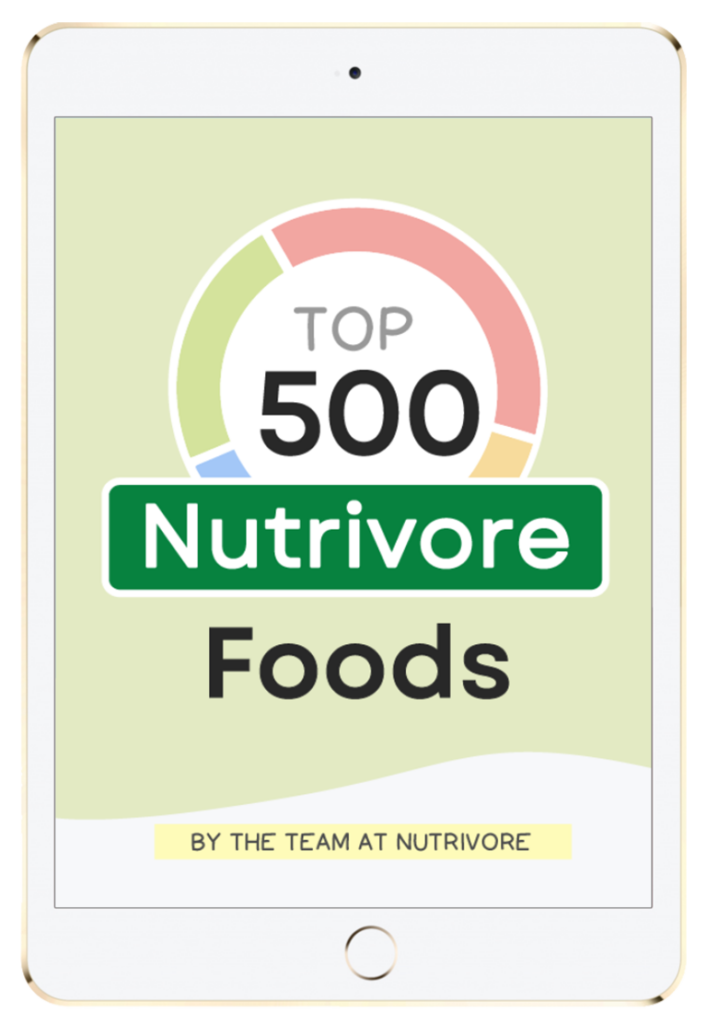
Top 500 Nutrivore Foods
The Top 500 Nutrivore Foods e-book is an amazing reference deck of the top 500 most nutrient-dense foods according to their Nutrivore Score. Think of it as the go-to resource for a super-nerd, to learn more and better understand which foods stand out, and why!
If you are looking for a quick-reference guide to help enhance your diet with nutrients, and dive into the details of your favorite foods, this book is your one-stop-shop!
Buy now for instant digital access.
What are the Good Food Sources of Iodine?
The following foods are also excellent or good sources of iodine, containing at least 10% (and up to 50%) of the daily value per serving.
Citations
Expand to see all scientific references for this article.
Bath SC, Steer CD, Golding J, Emmett P, Rayman MP. Effect of inadequate iodine status in UK pregnant women on cognitive outcomes in their children: results from the Avon Longitudinal Study of Parents and Children (ALSPAC). Lancet. 2013 Jul 27;382(9889):331-7. doi: 10.1016/S0140-6736(13)60436-5.
Behrouzian R, Aghdami N. Urinary iodine/creatinine ratio in patients with stomach cancer in Urmia, Islamic Republic of Iran. East Mediterr Health J. 2004 Nov;10(6):921-4.
Bougma K, Aboud FE, Harding KB, Marquis GS. Iodine and mental development of children 5 years old and under: a systematic review and meta-analysis. Nutrients. 2013 Apr 22;5(4):1384-416. doi: 10.3390/nu5041384. Erratum in: Nutrients. 2014 Dec;6(12):5770-1.
Chen ZP, Hetzel BS. Cretinism revisited. Best Pract Res Clin Endocrinol Metab. 2010 Feb;24(1):39-50. doi: 10.1016/j.beem.2009.08.014.
Eskin BA, Grotkowski CE, Connolly CP, Ghent WR. Different tissue responses for iodine and iodide in rat thyroid and mammary glands. Biol Trace Elem Res. 1995 Jul;49(1):9-19. doi: 10.1007/BF02788999.
Groufh-Jacobsen S, Hess SY, Aakre I, Folven Gjengedal EL, Blandhoel Pettersen K, Henjum S. Vegans, Vegetarians and Pescatarians Are at Risk of Iodine Deficiency in Norway. Nutrients. 2020 Nov 20;12(11):3555. doi: 10.3390/nu12113555.
Hughes K, Eastman C. Goitre – causes, investigation and management. Aust Fam Physician. 2012 Aug;41(8):572-6.
Hynes KL, Otahal P, Hay I, Burgess JR. Mild iodine deficiency during pregnancy is associated with reduced educational outcomes in the offspring: 9-year follow-up of the gestational iodine cohort. J Clin Endocrinol Metab. 2013 May;98(5):1954-62. doi: 10.1210/jc.2012-4249.
Institute of Medicine (US) Panel on Micronutrients. Dietary Reference Intakes for Vitamin A, Vitamin K, Arsenic, Boron, Chromium, Copper, Iodine, Iron, Manganese, Molybdenum, Nickel, Silicon, Vanadium, and Zinc. Washington (DC): National Academies Press (US); 2001. 8, Iodine.
Iodine: Fact Sheet for Health Professionals. National Institutes of Health (NIH) Office of Dietary Supplements. 28 Apr 2022.
Kessler JH. The effect of supraphysiologic levels of iodine on patients with cyclic mastalgia. Breast J. 2004 Jul-Aug;10(4):328-36. doi: 10.1111/j.1075-122X.2004.21341.x.
Qian M, Wang D, Watkins WE, Gebski V, Yan YQ, Li M, Chen ZP. The effects of iodine on intelligence in children: a meta-analysis of studies conducted in China. Asia Pac J Clin Nutr. 2005;14(1):32-42.
Schneider MJ, Fiering SN, Thai B, Wu SY, St Germain E, Parlow AF, St Germain DL, Galton VA. Targeted disruption of the type 1 selenodeiodinase gene (Dio1) results in marked changes in thyroid hormone economy in mice. Endocrinology. 2006 Jan;147(1):580-9. doi: 10.1210/en.2005-0739.
Schomburg L. Selenium, selenoproteins and the thyroid gland: interactions in health and disease. Nat Rev Endocrinol. 2011 Oct 18;8(3):160-71. doi: 10.1038/nrendo.2011.174.
Shrivastava A, Tiwari M, Sinha RA, Kumar A, Balapure AK, Bajpai VK, Sharma R, Mitra K, Tandon A, Godbole MM. Molecular iodine induces caspase-independent apoptosis in human breast carcinoma cells involving the mitochondria-mediated pathway. J Biol Chem. 2006 Jul 14;281(28):19762-71. doi: 10.1074/jbc.M600746200.
Stagnaro-Green A, Abalovich M, Alexander E, Azizi F, Mestman J, Negro R, Nixon A, Pearce EN, Soldin OP, Sullivan S, Wiersinga W; American Thyroid Association Taskforce on Thyroid Disease During Pregnancy and Postpartum. Guidelines of the American Thyroid Association for the diagnosis and management of thyroid disease during pregnancy and postpartum. Thyroid. 2011 Oct;21(10):1081-125. doi: 10.1089/thy.2011.0087.
Zimmermann MB. Interactions of vitamin A and iodine deficiencies: effects on the pituitary-thyroid axis. Int J Vitam Nutr Res. 2007 May;77(3):236-40. doi: 10.1024/0300-9831.77.3.236.
Zimmermann MB. Iodine: it’s important in patients that require parenteral nutrition. Gastroenterology. 2009 Nov;137(5 Suppl):S36-46. doi: 10.1053/j.gastro.2009.07.074.
Zimmermann MB. The influence of iron status on iodine utilization and thyroid function. Annu Rev Nutr. 2006;26:367-89. doi: 10.1146/annurev.nutr.26.061505.111236.
Ready to Make Healthy Eating Feel Effortless?
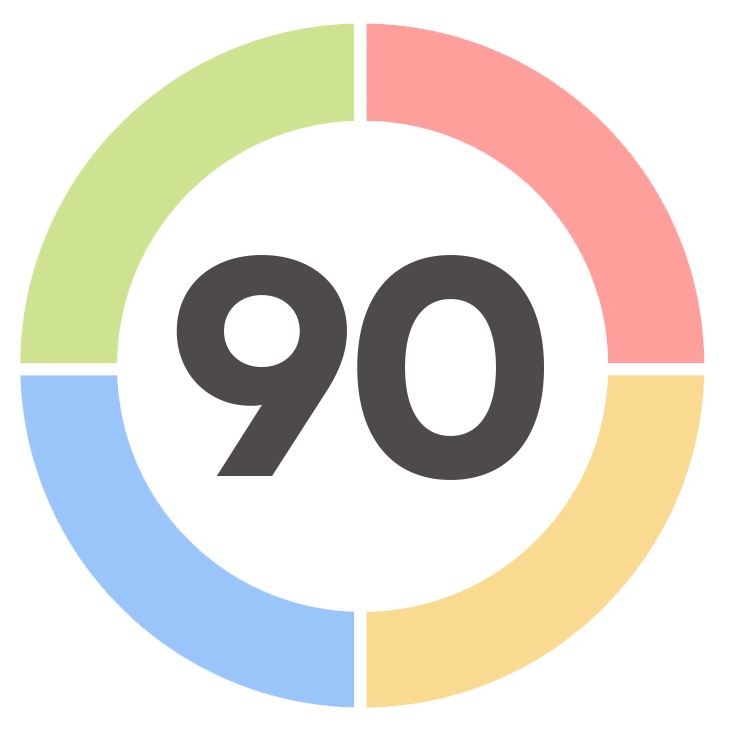
Join the FREE 90-day Nutrivore90 Challenge and build lasting habits with no food rules, no guilt—just real progress.
- Weekly downloads, journal prompts, and reflection tools—all completely free.
- Focus on nutrient density, not restriction
- Nutrivore90 starts January 5th, 2026!



